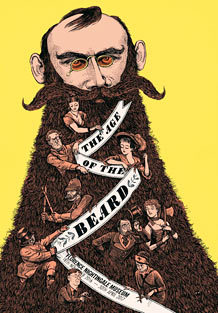
The Age of the Beard, is curated by University of Exeter historian Dr Alun Withey
The Age of the Beard: magnificent examples of 19th-century facial hair on display
A photographic display of magnificent examples of 19th-century facial hair and a special version of the pantomime Bluebeard are part of a new exhibition showing how men’s beard and moustaches have changed throughout history.
The University of Exeter show, hosted by the Florence Nightingale Museum in London, will be launched with demonstrations of cutthroat shaving by barbers wearing Victorian costumes and a range of other themed-activities from the period on 17 November.
As well as the pantomime there will be talks by experts on the history of facial hair, Victorian hair jewellery, the beards featured in the Ladybird children’s books, the health and hygiene of facial hair and why so many Victorian men sported facial hair with pride.
The exhibition, The Age of the Beard, is curated by University of Exeter historian Dr Alun Withey, whose Wellcome-funded research project Do beards matter? Facial hair, health and hygiene in Britain, c1700-1918, explores the changes in men’s facial hair over time and the significance, context and meanings of beards and moustaches throughout history.
Dr Withey’s research on health and the male body in British society shows how decisions to wear, or not to wear, facial hair have always been closely linked with changing views of masculinity, the body, gender, sexuality and culture.
Dr Withey said: "All sorts of extraordinary examples of facial hair will be on display at this exhibition. As well as being entertaining they also provide fantastic evidence of the way that Victorian men looked.”
“I’m very excited about the event, which brings together a collection of wonderful images, artefacts and events, and which will hopefully encourage people to think anew about an important aspect of the male face which is often downplayed or overlooked.”
The exhibition will take place at the Florence Nightingale Museum in London from November 2016 to Spring 2017. It is being funded through a public engagement award of £30,000 from Wellcome, a global charitable foundation which exists to improve health for everyone by helping great ideas to thrive.
Date: 5 October 2016
